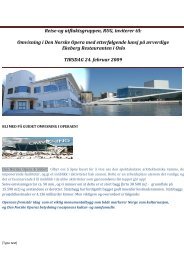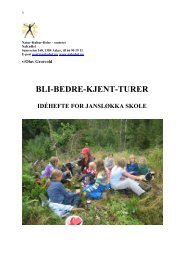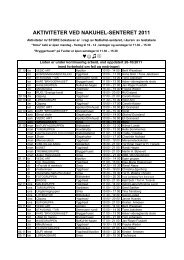Natur og Kultur som Folkehelse - NaKuHel
Natur og Kultur som Folkehelse - NaKuHel
Natur og Kultur som Folkehelse - NaKuHel
Create successful ePaper yourself
Turn your PDF publications into a flip-book with our unique Google optimized e-Paper software.
INTERNATIONAL SYMPOSIUM<br />
LOCAL COMMONS IN THE ENVIRONMENTAL STATE<br />
Ken Takeshita, Professor, Law School of Kansai University, Osaka, Japan<br />
The increasing refinement of technol<strong>og</strong>y enhances<br />
the accumulation of scientific operating processes,<br />
and the increasing density of processes correspondingly<br />
raises their repercussive influence,<br />
while also increasing the rate of unpredictability.<br />
Through the conjunction of risks which are actualized<br />
as pollution incidents and risks which have<br />
yet to be realized, the dangers which people are exposed<br />
to in contemporary society involve a heightened<br />
degree of risk which constitutes a qualitative<br />
change from the situation previously. This risk is a<br />
continuum stretching from situations where danger<br />
is definite to those where danger exists as a probability<br />
but is not actualized or realized, and on to<br />
situations of apprehension which are not perceived<br />
as dangerous. The overall term for these dangers<br />
and apprehensions is risk, and in this sense contemporary<br />
society is indeed a risk society.<br />
The qualitative change in repercussive effect in the<br />
risk society has also taken place in fields where<br />
scientific prediction should be possible. Nowadays,<br />
when the manipulation of nature through technol<strong>og</strong>y,<br />
is no longer restricted to matter outside the<br />
human body but has invaded its interior, scientific<br />
predictability can be seen as still more difficult.<br />
Originally, the domination of nature by science<br />
meant the control of nature outside the human<br />
body. Humans made use of science and technol<strong>og</strong>y<br />
to protect against threats from nature such as<br />
natural disasters and animal attacks and to modify<br />
nature so as to derive useful resources from it.<br />
Inventions such as the automobile and airplane<br />
cause accidents, but however great the damage<br />
to humans may be, it is nevertheless the result of<br />
external invasion.<br />
However, as illustrated in the examples of drug<br />
damage and food contamination, the risk from<br />
pharmaceuticals and foodstuffs involves nature<br />
within the human body. Here,nature, which supposedly<br />
exists outside the human body, has extended<br />
into its interior via human life support<br />
systems, in parallel with which risk is also internalized.<br />
The fact that risk has thus become interior<br />
for humans is a major distinctive feature of contemporary<br />
risk. The same situation applies also<br />
in environmental risk, in the case of which what<br />
exposes us to risk is not foodstuffs but the ecosystem<br />
which supports human life. The modification<br />
of the human life support system through science<br />
and technol<strong>og</strong>y causes an invasion of the interior<br />
of the human body through the medium of the<br />
ecosystem.<br />
Given this situation, the governing orientation<br />
of the environmental state must emphasize the<br />
preservation of the natural environment. From<br />
this standpoint, stewardship to preserve the ecosystem<br />
in the form of the natural environment is<br />
important. Moreover, given the current situation<br />
in which nature is being invaded, this stewardship<br />
must not only be in affinity with the ecosystem, but<br />
must also be regenerative. In this connection, the<br />
utilization and preservation of traditional commons<br />
has adopted sustainable forms promoting symbiosis<br />
with nature, and has been in agreement with<br />
the orientation described here.<br />
By living in the locality, the community which<br />
is the managing agent of the commons is, as it<br />
were, integrated as part of the ecosystem, so that<br />
the continuation of its livelihood requires the<br />
preservation of the ecosystem. However, historic<br />
development suggests that it will not be possible<br />
to remove<br />
29





